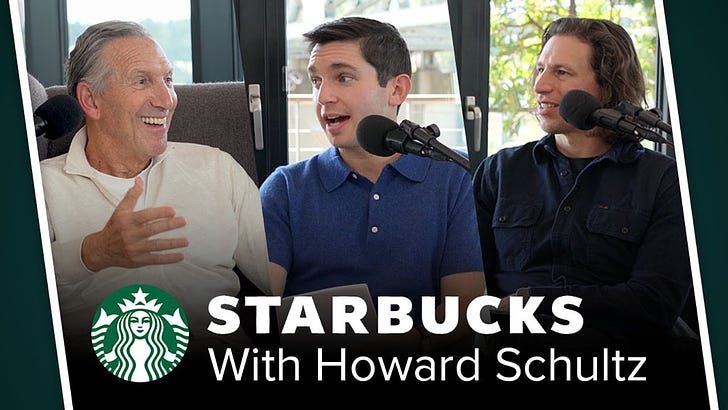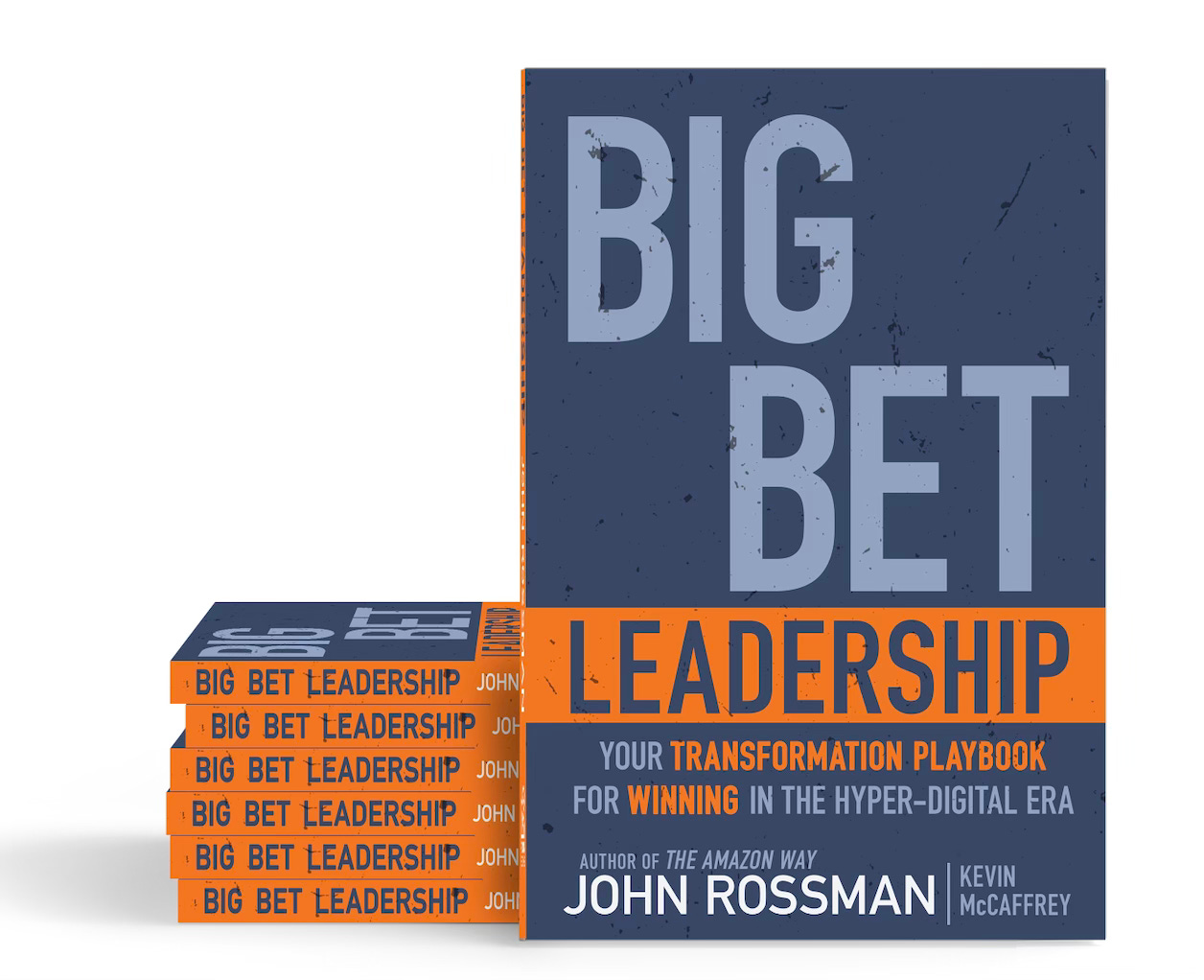"It Nevers Ends Well" -- Howard Schultz on Starbucks and The Innovators Dilemma
The massive lesson from a legendary business leader
Strategies and Techniques for Change Agents, Strategists, and Innovators
My successor will need one other particular strength: the ability to fight off the ABCs of business decay, which are arrogance, bureaucracy and complacency. — Warren Buffett
My family has an active text chat group. Critical topics often include updates on our dog, Bossman Rossman, various recipes being cooked up, and great content recommendations—music, podcasts, or books. My wife sent an episode of the Acquired Podcast interview with Howard Schultz, the founder of Starbucks, with a “thumbs up!” endorsement. When my wife makes a recommendation like that, I’ve learned to pay attention.
But the podcast is over three hours of conversation!
At first, I grimaced. Many of us in the Seattle area still have still not forgiven Howard Schultz for selling the Seattle Super Sonics to Clay Bennett in 2006, leading to the franchise's departure from Seattle to Oklahoma City. There is still PTSD and ill-will for many fans…but legends (and I put Schultz in that category) often have bad chapters and they should not be judged by one situation. I put aside my negative attitude, and I’m so glad I did!
The Acquired Podcast always digs deep on the story, the playbook and the nuanced versions of truths to dig the insights out. In this discussion with Howard Schultz, the hosts of the Acquired Podcast, Ben Gilbert, and David Rosenthal cover the founding, near death, scaling, succession challenges, lessons and current situation at Starbucks.
But maybe you don’t have three hours and fifteen minutes to digest this treasure chest of leadership, history and business learning. The Digital Leader Newsletter is here to curate, focus, and get you to the critical point, not just saving you time but putting a point of emphasis, expansion, and learning around it.
While I fully recommend listening to this entire interview because there are so many gems in this conversation, here’s your cheat code — the fast pass to the key observation and insight from this titan in business through a sometimes brutally honest conversation.
The Innovators Dilemma
The Innovator's Dilemma, coined by Clayton Christensen, is a paradox that shakes the very foundation of established businesses: the very practices that lead to their success can also set them up for failure. It exposes how market leaders, despite their dominance, often miss out on groundbreaking innovations because they are too focused on refining existing products for current customers. As they pour resources into sustaining their market stronghold, disruptive technologies (or practices) —often overlooked as insignificant—quietly evolve and eventually upend entire industries. This dilemma reveals a harsh truth: staying on top requires not just listening to your best customers, but also daring to disrupt your own successes before an outsider does it for you.
Schultz’s Own Critical Assessment: This is Starbuck’s Biggest Disease
In a reflective, honest, and thoughtfully critical manner, Schultz laid out the challenge for Starbucks, the ubiquitous brand and company that created coffee culture in America. Here’s Howard discussing the essential problem for Starbucks:
(edited for conciseness and readability)
“It’s the very things that make the business successful, the founder bets, that then at some point in the company's second act, hold it back. You have all this muscle memory as a company of relying on founder maverick acts.
The other thing is that most founder-led companies are entrepreneurially driven. It's not that they're not following the rules—they're making the rules, especially if you're creating an industry that did not exist. When a founder leaves, the company loses not only the entrepreneurial DNA but also of the ability to be on offense.
And the worst thing that a company can do, like a sports team, is start playing defense because you're afraid to fail. That is a disease. Not unlike another disease which has happened in Starbucks, which is hubris.
I think, over time, that has happened at Starbucks.”1
They lose the ability to be on offense. And the worst thing that a company can do, like a sports team, is start playing defense because you're afraid to fail. That is a disease. Not unlike another disease which has happened in Starbucks, which is hubris.
Did I Just Hear That Right?
We are so used to our leaders giving empty-calorie responses to good questions asking for critical self-assessment. Typical responses to poor performance on “where is the company now after you’ve left”, tend to be some variety of “I’m leaving to spend more time with my family” or “We’ve got work to do but I’m thrilled with how we are positioned.” It’s like a Derek Jeter interview — they give you nothing. Just cliches. Vanilla nothingness.
Howard Schultz delivered something we rarely see …the critical truth, a diagnosis of the situation.
He goes on to be direct—not critical—but direct in his assessment of the current CEO and board. He then talks about what he found when he returned in April 2022.
“I came back to the company (in 2022). Now when I came back, and I want to be fair, I don't want to criticize anyone, but when I came back, I saw things that really surprised me about the lack of investment over a four to five -year period.
I didn't like the way the stock buybacks were being used to basically increase EPS. And it's no way to run a company. So the first day I came back, and I knew what the market would do, is I announced that we were suspending the stock buybacks, and stock went down.
I saw things that really surprised me about the lack of investment over a four to five -year period. And also, I didn't like the way the stock buybacks were being used to basically increase EPS. And it's no way to run a company.
I expected it, and I announced that we were going to take basically the money we were using to stock buybacks for the year, and I think it was north of $2 billion, and invest back into the people of Starbucks, the partners, which I did.
The most important thing I did, though, because I'm not a messiah, but I have an instinct about the company and I know the inner workings of the company better than anyone else. I know the people. And so in a year's time, despite the underinvestment and the challenges, we brought the company back to a much healthier place operationally, and certainly the stock price was significantly higher when I left.”
Will We Ever Learn?
Competitive advantage is short-lived and getting shorter. Purely incremental investments, operational excellence, and cost cutting, are important, but they will not typically suffice for long. Boards and executives need to stay aggressive, continue to play aggressive offense, avoid the “ABC’s of corporate decay,” and manage a portfolio of bold moves.
We call these “big bets.” A big bet is any strategy, plan or investment which has daring and high potential impact for the business, but is unproven, has risks, dependencies and unknown unknowns.
What Schultz understands that the Starbucks Board and executive had lost sight of is that big bets are not optional if a business wants to sustain growth over the long term. Share buybacks and dividends can be a quick and easy way to pump the price of a stock but they do not lead to long-term, compounding growth. Schultz had the courage to accept a short-term stock decline in order to bet big on the long term, a bet that paid off.
Not all executives have the same confidence in placing big bets as Howard Schultz. Because failure rates are extremely high on large and complex initiatives, with big bets being even more complex, they require bold ambition paired with disciplined testing of the critical “things that must be true” before making large commitments. “Think Big, but Bet Small” is the title of one chapter and captures the key insight to success.
A special leadership and operating model is needed, which we have outlined in an actional manner in:
Big Bet Leadership: Your Transformation Playbook to for Winning in the Hyper-Digital Era
The most interesting piece of feedback I have gotten on Big Bet Leadership is this observation: “Big Bet Leadership is the cure for the Innovator’s Dilemma.”
Get your copy today! The print book is beautiful, and the audiobook is a great listening experience. If you’d like a team discussion, signed author copies, or perhaps if you sense that your organization might be suffering from the “ABC’s of corporate decay”, please contact me.
Onward!
John
About The Digital Leader Newsletter
John Rossman is a keynote speaker, innovation coach, and strategy advisor. The Digital Leader Newsletter is a weekly coaching session focused on customer-centricity, innovation, and strategy. We deliver practical theory, examples, tools, and techniques to help you build better strategies, plans, and solutions—but most of all, to think and communicate better.
From Acquired Podcast — https://www.acquired.fm/episodes/starbucks-with-howard-schultz




